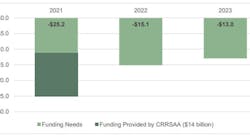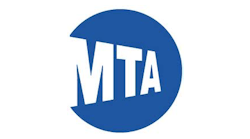New York MTA backs off service reductions and layoffs, but still faces $8 billion deficit through 2024
The COVID-19 pandemic-induced financial crisis within the largest transit system in the United States has eased but not abated. While drastic service cuts are off the table for now and Metropolitan Transportation Authority (MTA) leaders anticipate $6.2 billion in capital project commitments in 2021, they are also calling on the passage of President Joe Biden’s American Rescue Plan to help it bridge a nearly $8-billion deficit through 2024.
In November, MTA outlined plans to reduce service by up to 40 percent on subway and bus lines and up to 50 percent its rail lines. In addition to service cuts, the authority anticipated eliminating more than 9,000 positions, all in an effort to fight against lost revenues and increased expenses caused by the COVID-19 health crisis.
The service cuts and staffing reductions are no longer being considered in 2021 or 2022 but could reenter the picture in 2023.
MTA noted its updated financial plan to reflect the $1.15 billion improvement credits positive re-estimates of subsidies from New York State and others, unused funds from the 2020 General reserve, a reduction in debt service costs and a better-than-expected year end cash balance. The authority was allocated an additional $4 billion in federal emergency relief from the Coronavirus Response and Relief Supplemental Appropriations Act of 2021. However, this was about $500 million less than anticipated. MTA’s savings efforts produced $92 million less than anticipated and the authority estimates a delay in the 2021 fare/toll increases will result in $32 billion less in revenues.
The MTA Board approved an increase in toll rates on Feb. 18 at MTA’s nine bridges and tunnels that is estimated to raise $62 million in 2021 and $116 million annually beginning in 2022.
“The MTA agencies have generated $500 million in critically needed new annual recurring savings, but our financial picture remains extremely challenging,” said MTA Chief Financial Officer Robert Foran. “We have avoided worst-case service cuts in 2021 and 2022, but this remains the most difficult financial challenge the MTA has faced – an order of magnitude worse than anything the agency has ever faced in its history.”
On the subject of anticipated capital plans for 2021, the MTA believes it will be able to issue at least $6.2 billion in project commitments in 2021, which is more than the $5.4 billion it committed in 2020 and significantly lower than what it anticipated to commit in 2020 before the start of the COVID-19 pandemic.
MTA Construction & Development notes the plans can be scaled up to match available resources should additional financial support materialize.
While MTA’s record $51.5-billion 2020-2024 Capital Program was paused last year, previous four-year capital programs funded the completion of $4.3 billion in projects in 2020, as well as completion of another $7.18 billion in projects in 2021.
MTA Chairman and CEO Patrick Foye explained the rosier financial plan only provides for short-term stability and the pandemic is projected to “wreak havoc on the MTA’s finances for the next four years as ridership gradually rebuilds.”
“We continue to urgently request $8 billion in additional federal aid as part of the American Rescue Plan so we can serve as the economic engine leading New York’s recovery from this devastating pandemic,” said Foye.
President Biden’s proposed American Rescue Plan includes $20 billion the transit industry. Last week, the House Transportation & Infrastructure Committee preserved a proposed $30 billion in transit emergency funding during a markup of the Fiscal Year 2021 Budget Reconciliation bill. The bill was approved to move to the House Budget Committee, which will hold a markup on Feb. 22.

Mischa Wanek-Libman | Group Editorial Director
Mischa Wanek-Libman is director of communications with Transdev North America. She has more than 20 years of experience working in the transportation industry covering construction projects, engineering challenges, transit and rail operations and best practices.
Wanek-Libman has held top editorial positions at freight rail and public transportation business-to-business publications including as editor-in-chief and editorial director of Mass Transit from 2018-2024. She has been recognized for editorial excellence through her individual work, as well as for collaborative content.
She is an active member of the American Public Transportation Association's Marketing and Communications Committee and served 14 years as a Board Observer on the National Railroad Construction and Maintenance Association (NRC) Board of Directors.
She is a graduate of Drake University in Des Moines, Iowa, where she earned a Bachelor of Arts degree in Journalism and Mass Communication.






